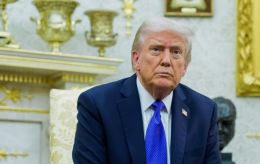U.S. discusses the possibility of military conflicts with Russia and China
 The U.S. war with Russia and China was discussed in the Congress (Photo: Getty Images)
The U.S. war with Russia and China was discussed in the Congress (Photo: Getty Images)
The threats of military conflicts with Russia and China, including the possibility of using nuclear weapons, were discussed in the U.S. Congress, according to the Congress press service and Voice of America.
On Wednesday, November 15, hearings were held in the U.S. House Armed Services Committee, dedicated to the findings of a report presented by the Congress-appointed U.S. Strategic Posture Commission.
The report addresses the threats from Russia and China and ways to restrain potential conflicts involving the U.S. and its allies.
Nuclear weapons
In the U.S., there is concern that Russia possesses the world's largest and most diverse nuclear arsenal. Congressman and Republican Committee Chair Mike Rogers emphasized that Russia's arsenal is growing, as its capabilities enable the production of hundreds of warheads annually.
"The most alarming is the stockpile of non-strategic nuclear weapons not restricted by any treaty, where Russia has a 10 to 1 advantage over the U.S.," said Rogers.
The report emphasizes that the risk of a large-scale nuclear conflict remains low, but the likelihood of using nuclear weapons, including on U.S. territory, is increasing. Meanwhile, the risk of a military confrontation with Russia and China or both, while not inevitable, has grown.
Restraint against Russia
The report authors believe that the U.S. and its allies should be prepared to counteract both nuclear adversaries - Russia and China - between 2027 and 2035.
The report recommends increasing the number of strategic B-21 bombers and new Columbia-class nuclear submarines. It also suggests deploying more tactical nuclear weapons in Asia and Europe and developing plans for the placement of U.S. reserve nuclear warheads.
The report makes some forecasts:
- Russia and China will continue to increase their nuclear potential.
- China will continue to build conventional military capabilities, including space and cyber capabilities.
- U.S. restraint measures must be reliable and perceived as such by both allies and adversaries.
- The U.S. nuclear modernization program must be fully implemented as quickly as possible to restrain Russia and China.
War in Ukraine
Congress members believe that Russia speculated about using nuclear weapons in Ukraine. In particular, discussions revolved around the use of strategic or non-strategic nuclear weapons in the event of Russia's defeat or as a cover for withdrawal.
Preceding events
On November 2, Russian dictator Vladimir Putin signed a law on Russia's withdrawal from the Comprehensive Nuclear-Test-Ban Treaty.
The treaty was adopted at a UN General Assembly session in 1996 but did not enter into force because a sufficient number of countries did not sign it.
Russia's last nuclear test took place in 1990. However, in February 2023, Russian dictator Vladimir Putin ordered the preparation of a test site for such testing.
According to the General Staff of the Ministry of Defense, Russia recently conducted unsuccessful tests of the Yars and Bulava nuclear weapons carriers.

